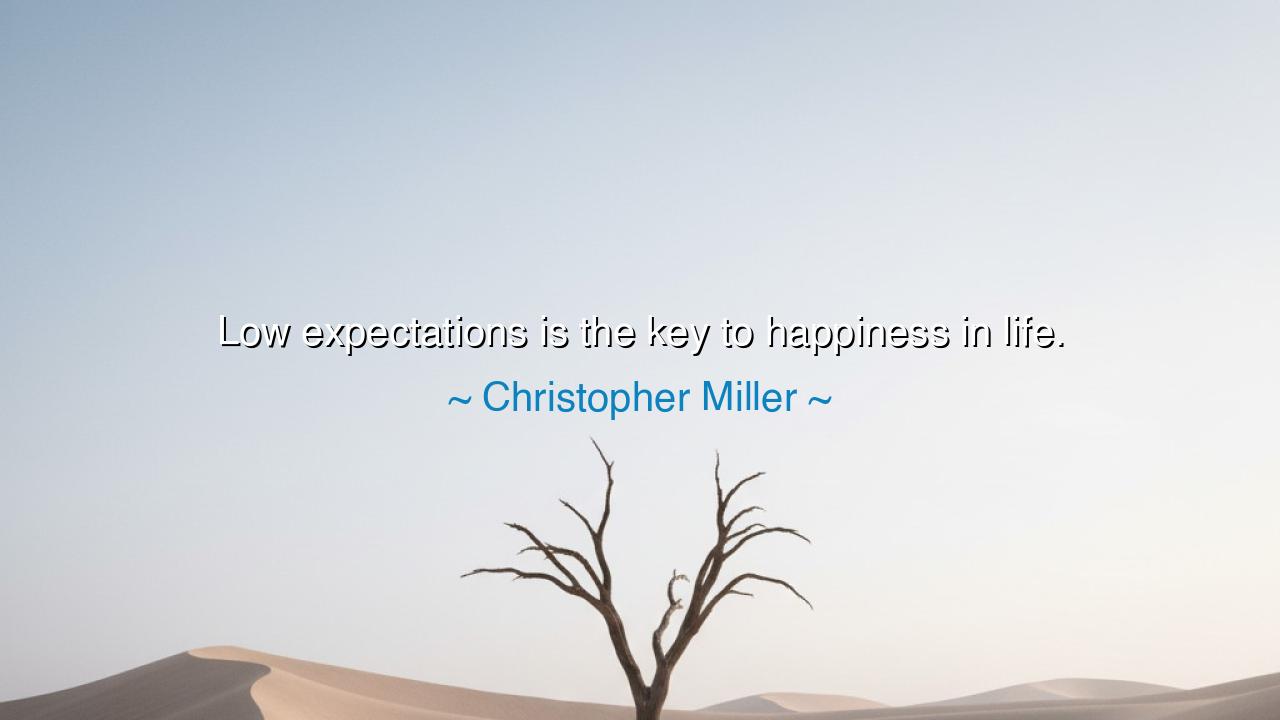
Low expectations is the key to happiness in life.






Christopher Miller, with the wit of a philosopher and the clarity of a realist, once said: “Low expectations is the key to happiness in life.” Though this phrase may sound humble, even humorous, it conceals a deep and enduring truth about the human heart. For in this age, as in every age before it, men and women have burdened themselves with endless striving — expecting perfection from the world, from others, and from themselves. And yet, as the ancients knew, expectation is the root of suffering. Miller’s words are not an anthem of defeat, but an invitation to peace, a reminder that happiness belongs not to those who demand too much from life, but to those who accept it as it is.
To understand his meaning, one must first know the nature of expectation. Expectation is the shadow cast by desire — the illusion that life must conform to our wishes. We imagine that happiness lies in a future where everything aligns with our hopes, and in so doing, we abandon the present moment. But the wise have always taught that joy is not found in control, but in acceptance. To have “low expectations” does not mean to surrender ambition or hope, but to free oneself from the tyranny of disappointment. It means to approach life not with entitlement, but with gratitude — to marvel at every small blessing instead of mourning every unmet dream.
This truth was known to the Stoics, those philosophers of old who sought peace not in pleasure, but in perspective. Epictetus taught: “He who expects nothing shall never be disappointed.” He lived as a slave, yet he spoke with the serenity of a king, because he understood that freedom begins where expectation ends. His joy came not from the world’s gifts, but from the mastery of his own mind. When Christopher Miller spoke of “low expectations,” he echoed this same eternal wisdom — that happiness is not the reward of the fortunate, but the skill of the content.
Consider the story of Diogenes of Sinope, the philosopher who lived in a barrel. When Alexander the Great visited him and asked if he could grant any wish, Diogenes replied simply, “Yes — stand out of my sunlight.” The world saw poverty, but Diogenes saw freedom. He expected nothing, and therefore lacked nothing. His joy was invincible because it depended on nothing beyond himself. He reminds us that the fewer the expectations, the lighter the spirit, and that to live without grasping is to possess all things.
Yet Miller’s teaching does not call us to apathy, but to clarity. It does not forbid dreams; it cautions us to hold them lightly. For it is not ambition that destroys happiness, but attachment. To work with passion is noble, but to demand success from the universe is folly. The harvest is not always equal to the effort — yet there is beauty even in the sowing. The man of low expectations does not cease to strive; he simply ceases to suffer when the outcome is uncertain. His joy flows from the act itself — from doing what is right, from living with purpose, from savoring the moment, regardless of reward.
In modern life, this wisdom is needed more than ever. Many measure happiness by achievement, by wealth, by praise — yet these are fleeting gifts. When they vanish, despair follows. The one who has learned to expect little and appreciate much remains unshaken. He finds wonder in the ordinary — in laughter shared, in a sunrise glimpsed, in the quiet success of a day well-lived. For him, life is not a disappointment to be endured, but a miracle to be received, again and again.
So, my listener, take this truth into your heart: lower your expectations, and you will raise your joy. Do not demand perfection from yourself or others; instead, seek understanding. Be grateful for each breath, each kindness, each small victory. Expect less of the world, and you will see more of its beauty. This is not resignation — it is liberation. For the one who walks through life without clinging, without constant craving, walks in freedom. And that freedom — quiet, steady, and unbreakable — is the truest form of happiness.






AAdministratorAdministrator
Welcome, honored guests. Please leave a comment, we will respond soon